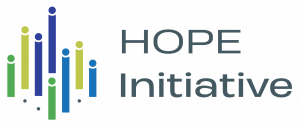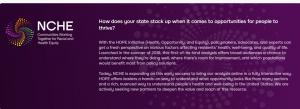
Hope Initiative on Americans’ Health Unveils Crucial Updates, Highlighting Opportunity Approach to Addressing Inequities
Website's new statistics provide an Innovative, interactive experience, sharing comprehensive data to researchers and public. Go to www.hopeinitiative.org
WASHINGTON, DC, UNITED STATES, April 22, 2025 /EINPresswire.com/ -- The Health Opportunity and Equity (HOPE) Initiative has launched major updates to its state-of-the-art platform, underscoring the urgent need to address health inequities. These updates provide achievable pathways for states to eliminate health disparities, emphasizing the immediate action required to ensure health equity for all.
While original projections were based on information published on the HOPE website in 2020, new data sets published in 2024 make the scenarios more relevant to 2025. HOPE tracks 27 indicators on health outcomes and factors that shape health and well-being, such as social and economic factors, community and safety conditions, physical environment, and access to health care. The information about these social determinants of health identifies opportunity gaps for people of color that frequently lead to poor health outcomes.
Furthermore, HOPE data identifies where residents of individual states and the country are doing well and where states can do more to help residents be healthier. In doing so, HOPE calculates essential factors that help state and federal leaders, advocates, and other stakeholders shape policies and practices - where the gaps in opportunity are among people of different races and ethnicities, what goals for achieving equity look like, and how far they need to move the dial to make these goals a reality.
“The HOPE Initiative offers a practical, interactive data tool designed to guide states and the nation towards action for health equity,” stated Dr. Gail C. Christopher, Executive Director of the National Collaborative for Health Equity. “HOPE tracks social determinants of health and health outcomes by race, ethnicity, and socioeconomic status. Our unique analyses offer an opportunity framework to set aspirational but achievable goals to improve life outcomes. This information is critically needed during these uncertain times.”
The updated data shows that seven southern states (Mississippi, Oklahoma, Tennessee, Louisiana, West Virginia, Kentucky, and North Carolina) fare poorly on access to primary care, ranking in the bottom ten states with adequate access. Eight Northeastern states (New York, Pennsylvania, Vermont, Maine, Rhode Island, New Jersey, Connecticut, and Massachusetts) fare better on the food security indicator, ranking among the top ten states. Of the ten states with the best health outcomes, five are located in the West, and four are in the Northeast. Nine of the ten states with the poorest health outcomes are in the South.
“When we started the HOPE Initiative, we recognized that fresh research was needed to change the disparity narrative,” said Dr. Brian Smedley, an architect of the HOPE Initiative. “For too long, the attention has been on identifying health disparities and not enough on addressing those disparities…With this data, we can pinpoint where resources must be directed to make today’s efforts to reach health and community equity meaningful and lasting.”
HOPE data demonstrates the impact of the nation’s legacy of systemic racism that has left low-income, and communities of color disenfranchised from opportunities and contributed to their poor health. The new data was posted on the website in late 2024. Led by the National Collaborative for Health Equity (NCHE), partnered with Texas Health Institute and Virginia Commonwealth University’s (VCU) Center on Society and Health to design and develop the HOPE Initiative. NCHE, a renowned national organization, addresses health inequities through leadership collaboration, innovative use of data, and racial healing. The Robert Wood Johnson Foundation funds the HOPE Initiative. In 2021, John D. and Catherine T. MacArthur Foundation also funded NCHE in developing a Community of Practice (CoP) that engaged local leaders in applying the HOPE data and distance to goal process to help achieve more equitable recovery from the COVID-19 pandemic.
HOPE calculates obtainable goals for each category by averaging the best assessments from the top five states in the country, establishing realistic objectives for the states to reach. HOPE assesses indicators, sets goals, and computes the progress required by each state for racial groups to achieve health equity. Meeting the goals can provide pathways to stable jobs, quality schools, safe environments, food security, and other resources that significantly improve health outcomes. Moreover, achieving the goals would likely produce a more equitable society, where people of all races could thrive. For instance:
⮚ In California, the HOPE goal is for 98% of people in the state to have health insurance. According to the original HOPE data, 3,337,549 more people needed health insurance to reach the goal, but the new data shows progress with fewer people,2,210,047, needing health insurance to reach the goal.
⮚ In Maryland, the HOPE homeownership goal is for 81% of households in the state to own their homes. However, the homeownership situation has slightly decreased. According to the original HOPE data, 274,927 more households needed to own a home to reach the HOPE goal. Today, 280,027 more households must become homeowners to achieve the HOPE goal.
⮚ In Mississippi, the HOPE goal is only to suffer 2.5 infant deaths per 1,000 live births. Infant mortality has improved slightly in the state. The new data calls for 216 more infants surviving to their first birthday per year to reach the goal, while the original HOPE data indicated 238 more infants had to survive each year for the goal to be reached.
⮚ In Illinois, the HOPE goal is for 88% of adults to live in households with incomes greater than 250% of the Federal Poverty Level (FPL for a family of four in the contiguous states is $32,150 annually in 2025). Livable income has improved slightly. The original HOPE data indicated that 1,981,805 more Illinois adults with a livable income were needed to reach the HOPE goal. Today, the number is reduced to 1,779,452 more.
With the HOPE data, policymakers, advocates, and experts are provided a fresh perspective on various factors affecting residents’ health, well-being, and quality of life. Launched in the summer of 2018, this first-of-its-kind analysis offers broad audiences a chance to understand where they’re doing well, where there’s room for improvement, and which populations would benefit most from policy solutions.
“The HOPE data can help public health officials move beyond merely identifying inequities in communities of color to spurring action addressing social determinants affecting their health,” said Dr. Christopher. “For America to be a healthy nation, we must make health equity a reality for everyone by overcoming the legacy of centuries of inequitable opportunity structures.”
###
(For print or broadcast interviews with Dr. Christopher, please contact Michael Frisby at mike@frisbyassociates.com or 202-625-4328 to schedule.)
****
Dr. Gail C. Christopher, the Executive Director of the National Collaborative for Health Equity, is also a Senior Scholar at the Center for Advancement of Well-Being at George Mason University and a former Senior Advisor and Vice President of the W. K. Kellogg Foundation. She led the development and launch of Truth, Racial Healing, and Transformation (TRHT) at the W. K. Kellogg Foundation. Her new book is RX-Racial Healing: A Guide to Embracing Our Humanity.
About NCHE
Founded in 2014, NCHE was established to promote health equity through action, leadership, inclusion, and collaboration. NCHE works to create environments that foster the best possible health outcomes for all populations, regardless of race, ethnicity, socioeconomic status, or nativity. NCHE also works to improve conditions for health and well-being, including housing, education, income and wealth, and the physical and social environment. Further, NCHE believes that it is imperative that we address historical and contemporary structural, institutional, and interpersonal racism, which fuels inequities in our society.
Michael K. Frisby
Frisby & Associates
+1 202-625-4328
email us here
Visit us on social media:
Facebook
LinkedIn
Distribution channels: Culture, Society & Lifestyle, Education, Healthcare & Pharmaceuticals Industry, Human Rights, Social Media
Legal Disclaimer:
EIN Presswire provides this news content "as is" without warranty of any kind. We do not accept any responsibility or liability for the accuracy, content, images, videos, licenses, completeness, legality, or reliability of the information contained in this article. If you have any complaints or copyright issues related to this article, kindly contact the author above.
Submit your press release




